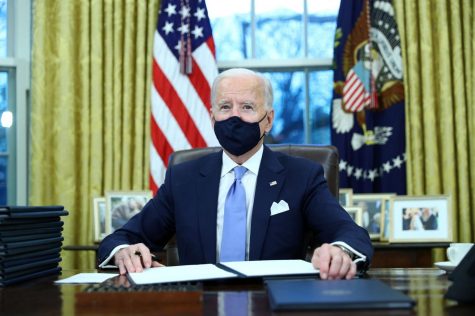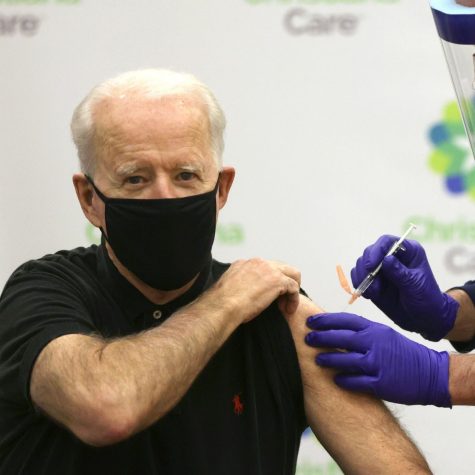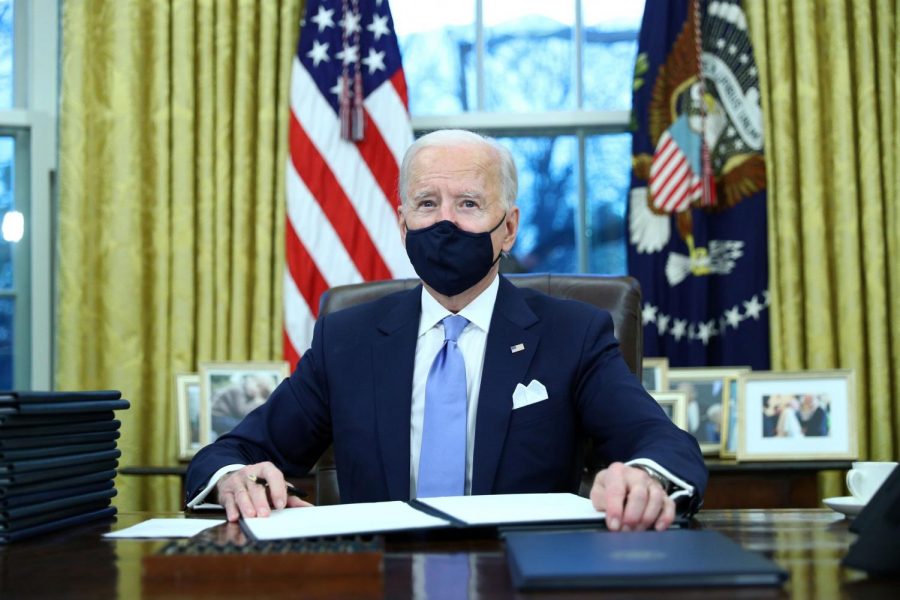Recap of Biden Administration’s First 3 Months in Office
President Joe Biden signs executive orders in the Oval Office after his inauguration.
March 15, 2021
Joe Biden, the 46th President of the United States was sworn into office on January 20, 2021, and wasted no time when it came to his agenda for his first 100 days. Not only the United States, but the world is in the midst of the COVID-19 pandemic which has killed more than 500,000 people in the United States and has omitted almost 10 million jobs over the past year.
Biden began his presidency with a storm of executive orders. Just within the first few hours following his inauguration, President Biden rejoined the Paris Agreement and the World Health Organization after President Trump’s withdrawal from both. It does not stop there, Biden also revoked the Trump Administration’s restriction on immigration from countries that are predominately Muslim.

The Biden Administration will be focused on two objectives: stopping the rapid spread of COVID-19 as well as providing families across the country with aid and economic assistance. By Biden’s 100th day in office, he hopes to have 100 million Americans vaccinated, to permit the Defense production Act which will increase the number of vaccines available, and to have the majority of elementary and middle schools reopen safely.
Biden’s push to help families in need through a stimulus is ultimately in the hands of Congress. Biden is depending on Congress to pass a $1.9 trillion relief package in order to provide economic relief to families across the country. He will need Republican support in order to do so, and as of right now, it is not clear how much Republican support he will be able to get. While the Democrats have control of both chambers, the pace at which negotiations are happening will most likely be slowed due to the Senate’s impeachment trial of Donald Trump.
The COVID-19 vaccine is slowly rolling out, but cases are still worsening and some believe that there will be over 700,000 Americans dead before the disease is fully under control. The Biden Administration has a plan to combat this prediction that includes speeding up the distribution of vaccines and reducing the number of new infections. In order to carry out this plan, the new Administration has gathered together a team of public-health experts such as Dr. Bechara Choucair and Dr. David Kessler. Biden and his administration plan to use The Defense Production Act as a way to increase the production of the supplies needed for the vaccines such as protective equipment. This proposed bill would fund sick days for families of low income who may have people within the household who need to take time off of work in order to get vaccinated.
In terms of the economy, President Biden proposed an economic stimulus on January 14th that would extend weekly enhanced unemployment insurance up until September, which would increase the issued amount from $300 to $400 and then send $1,400 in payments directly to most Americans. This plan would also channel $130 billion to schools in order to help them reopen safely and efficiently as well as $15 billion in the form of grants to small businesses that need help due to lost revenue. Other parts of Biden’s economic agenda involve asking requisite agencies to extend the federal moratorium on evictions and foreclosures until March 31 as well as pressing pause on student loan payments until September 30.

President Biden has been working hard to combat racial injustice and climate change during his first 100 days in office. On January 20, 2021, President Joe Biden became the first president in history to explicitly condemn white supremacy in his Inauguration speech. Biden is determined to assist communities of color who have been disproportionately hit by the pandemic, expand funding to community health centers, and focus on providing relief to small businesses owned by minorities. Expanding access to health care for women of color as well as working towards reforming the criminal justice system are high on Biden’s list of priorities.
In addition to Biden rejoining the Paris agreement, Biden also revoked the Keystone Pipeline permit as well as ordering federal agencies to reinstate environmental regulations that the Trump administration cut back on such as the rules regarding methane emissions in oil and gas production. Biden is also determined to drive demand for green products by mandating that federal agencies buy low-emission vehicles and other environmentally friendly products.
As you can see, President Joe Biden is hard at work combatting racial injustice and climate change while simultaneously trying to revive the United States economy while making sure that businesses and schools can reopen safely. Biden has already accomplished so much in just 100 days in office, who knows what he will be able to accomplish in four whole years.



